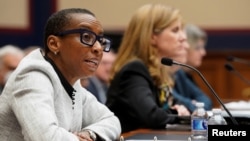Harvard University's governing board faced mounting pressure on Monday to publicly declare support for or oust the university president after remarks she made last week at a congressional hearing on antisemitism.
The Harvard Corporation, the university's governing body, has not yet addressed the public backlash Harvard President Claudine Gay received after her testimony.
Prominent alumni and members of Congress have called for her to resign as her fellow Ivy League leader at University of Pennsylvania, who also testified to Congress last week, did on Saturday. But many faculty and other alumni have rushed to defend Gay and asked the governing body to do the same.
The 13-member governing body was due to hold a regular meeting on Monday, according to media reports. A representative for Harvard did not respond to a request for comment.
Billionaire hedge fund manager Bill Ackman, who has donated millions to Harvard, wrote in an open letter to Harvard's board on Sunday that Gay had "quelched speech she disfavors while defending and thereby amplifying vile and threatening hate speech."
A petition urging her removal claimed over 1,100 alumni signatures as of midday Monday.
But the Harvard Alumni Association Executive Committee on Monday asked the Harvard Corporation to back Gay, the Harvard Crimson reported. Nearly 700 faculty members signed a petition supporting Gay as of Monday afternoon, while Black alumni and allies said on social media that they had gathered nearly 800 signatures on another petition supporting the president.
At a hearing before a U.S. House of Representatives committee on Tuesday, three university presidents — Gay, Liz Magill of Penn and Sally Kornbluth of Massachusetts Institute of Technology — declined to answer "yes" or "no" when asked if calling for the genocide of Jews would violate school codes of conduct regarding bullying and harassment.
The trio said they had to take free speech into consideration. Gay on Thursday apologized for her remarks at the hearing in an interview with Harvard's student newspaper.
The hearing increased public outcry over how U.S. colleges are handling campus protests since Hamas' October 7 attack on Israel. Jewish communities have claimed universities are tolerating antisemitism. Pro-Palestinian groups have accused the schools of being neutral or antagonistic toward their cause.
On Friday, 74 members of Congress, in a letter to the boards of all three schools, called for leadership changes.
Magill and the University of Pennsylvania Board of Trustees chair Scott Bok resigned from their posts on Saturday. The Executive Committee of the MIT Corporation said in a statement after Kornbluth's testimony that she still had its full support.
Free speech debate
Many on the political right have accused the university presidents of hypocrisy, saying they defended free speech at the congressional hearing but police speech when it offends causes they prefer.
At the hearing, Republican lawmakers grilled the presidents over their schools' diversity efforts and accused them of being inhospitable to conservative viewpoints.
Ackman also called for closing Harvard's office of diversity, equity, inclusion and belonging, and alleged that the committee that appointed Gay, a Black woman, to the presidency had discriminated against "non-DEI eligible candidates."
Civil rights activist Reverend Al Sharpton said Ackman's letter was a further assault on efforts to expand inclusion months after the Supreme Court, in a case that involved Harvard, struck down race-conscious college admissions programs.
At other U.S. universities, teachers have been suspended or banned from campus as the debate over violence in the Middle East roils. The University of Arizona on Dec. 1 reinstated two educators who were suspended in November.
The University of Southern California on Dec. 2 lifted restrictions on an economics professor who last month was directed to teach online.





